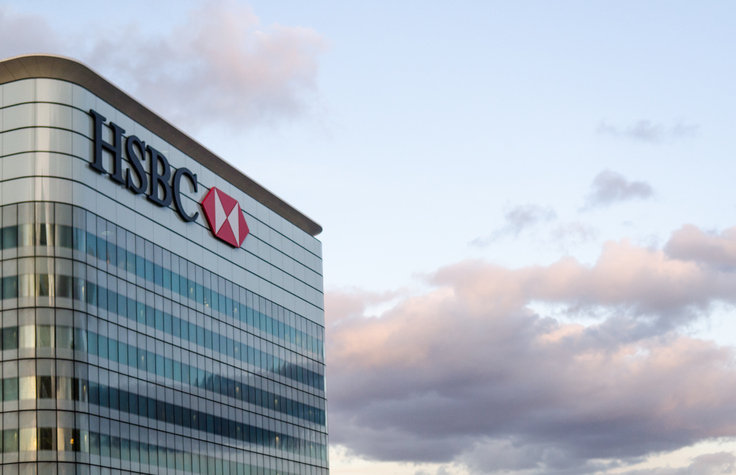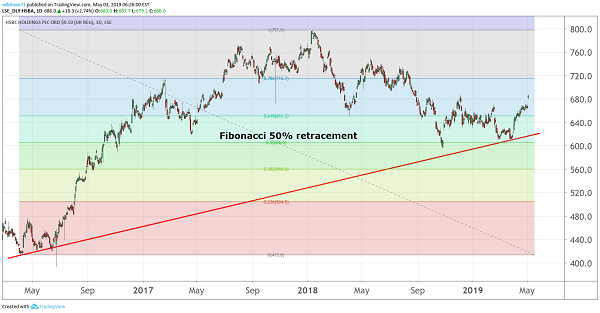Dividend king HSBC makes biggest profit in years
HSBC was far from perfect last quarter, but there’s lots to like, and the dividend is a huge plus.
3rd May 2019 12:59
by Graeme Evans from interactive investor
HSBC was far from perfect last quarter, but there's lots to like, and the dividend is a huge plus.

A bank reporting season dominated by Brexit uncertainty and investment banking weakness ended on a high note today as HSBC (LSE:HSBA) produced first quarter profits ahead of City hopes.
On a headline basis, the near-$5 billion of post-tax profits was HSBC's best in 14 quarters. Top-line growth of 5% also showed progress on the previous three months, in contrast to the disappointing revenue performances at Barclays (LSE:BARC), Lloyds Banking Group (LSE:LLOY) and Royal Bank of Scotland Group (LSE:RBS) in recent Q1 results.
Whereas UK-focused lenders are on the rack because of political and economic uncertainty, HSBC is making headway thanks to a continued surge in income from its core Asian business as fears over the impact of the US-China trade dispute begin to recede.
At a time when many of its rivals are retrenching, HSBC appears to be benefiting from being one of the last remaining global, diversified players. This strength and attractive dividend record comes at a price for investors, with analysts at UBS believing that the stock is trading at a "material premium". They have a price target of 625p, compared with today's 685p.

Source: TradingView Past performance is not a guide to future performance
One of the biggest developments in today's results was the 12% drop in reported operating expenses, meaning that adjusted jaws [compares income versus operating expenses] swung from a negative position in 2018 to plus 6%.
Positive jaws show where the revenue growth rate exceeds the cost growth rate [jaws refers to a chart that plots both metrics against one another giving the visual impression of a set of jaws. Positive jaws demonstrate that income growth is exceeding growth in operating expenses].
HSBC was far from perfect in the quarter, however. The group's net interest margin fell to 1.59%, some eight basis points lower than in 2018 and driven by the increased cost of customer accounts in Asia. Analysts will also want to know why the bank has not made more of recent rises in US interest rates.
Operations in the United States continue to frustrate, while the global banking and markets division saw revenues drop 5% amid reduced client activity across investment banking. The retail and wealth management and commercial banking divisions picked up the slack, with adjusted revenues up 10% and 11% respectively.
- HSBC shares: What does the future hold?
- Lloyds Banking Group Q1 2019 results in 90 seconds
- You can also invest in UK equities via ii’s Super 60 recommended funds. Click here to find out more
Chief financial officer Ewen Stevenson said: "Top-line revenue growth of 5%, returns up very nicely, profits up very nicely. We're not there yet – we've got very, very clear targets for what we want to achieve in 2020 on returns. But this is a very good quarter and sets us up well for the remainder of the year."
In February's annual results, HSBC said it was planning for positive adjusted jaws in 2019 and a return on equity of over 11% by 2020. The figure was 10.6% in Q1, up from 8.4% a year earlier.
Total dividends in respect of 2018 were $10.2 billion after the payment of 51 cents a share, a level that HSBC intends to at least maintain following the award of 10 cents a share today. The bank is one of the biggest dividend payers in the FTSE 100 index, with a forecast yield of just under 6%.
The common equity tier 1 ratio was up 30 basis points from December to 14.3%, ahead of the 14% target and adding to optimism that the bank can maintain its dividend level.
It also announced a $2 billion buy-back in 2018 as part of a drive to neutralise the impact of scrip dividends over the medium term. A decision on future share buy-backs will be made with forthcoming interim results.
These articles are provided for information purposes only. Occasionally, an opinion about whether to buy or sell a specific investment may be provided by third parties. The content is not intended to be a personal recommendation to buy or sell any financial instrument or product, or to adopt any investment strategy as it is not provided based on an assessment of your investing knowledge and experience, your financial situation or your investment objectives. The value of your investments, and the income derived from them, may go down as well as up. You may not get back all the money that you invest. The investments referred to in this article may not be suitable for all investors, and if in doubt, an investor should seek advice from a qualified investment adviser.
Full performance can be found on the company or index summary page on the interactive investor website. Simply click on the company's or index name highlighted in the article.